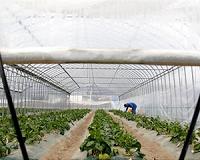 |
Geneva (AFP) March 23, 2011 Pakistan's government has pushed food prices too high for an impoverished population, as malnutrition levels rise despite the recovery of crops after devastating floods, a UN food relief official said Wednesday. Wolfgang Herbinger, director for the World Food Programme (WFP) in Pakistan, said food crops especially wheat in the southern flood-hit plains were recovering fast with the prospect of decent crops over the coming weeks. "The crop outlook is not bad but the food security situation remains difficult because prices remain so high," he told journalists one the sidelines of humanitarian meetings in Geneva. "The government is the biggest buyer of wheat in Pakistan they are setting the farm gate price and they dominate market," Herbinger explained. "That's why the wheat price in Pakistan didn't adjust when, for example, in 2009 and early 2010 the wheat price had gone back a lot, it stayed high to the detriment of local consumers." Now ordinary consumers pay double the price for wheat compared to three years ago and the food security situation has "changed dramatically," the WFP official added. Malnutrition levels in the southern province of Sindh have reached 21 to 23 percent, according to the agency. "That is well above African standards. The emergency standard is 15 percent," the WFP official said. A recent survey found that in some flood-hit areas 70 percent of people were taking out loans and even using them to pay for food. Herbinger admitted that the WFP was "struggling a bit" to bring the message across to authorities. "You may have the country full with food but people are too poor to buy it," he explained. "We are working a lot with the Ministry of Agriculture to explain to the minister that it is not enough to have enough production in the country if people can't afford it." "Maybe for political reasons he doesn't always understand it, that it's one thing to be nice to the farmers but if your consumers can't afford it then... there's something wrong with agricultural policy," Herbinger added. Massive floods caused by monsoon rains in July and August 2010 killed thousands, destroyed 1.7 million homes and damaged 5.4 million acres of arable land, experts have said.
Share This Article With Planet Earth
Related Links Farming Today - Suppliers and Technology
 Fears mount in Asia over Japanese food
Fears mount in Asia over Japanese foodManila (AFP) March 23, 2011 Supermarkets across Asia are selling fewer Japanese products and restaurants in "Little Tokyo" districts are suffering as fears rise that Japan's food chain is being dangerously tainted with radiation. Hong Kong became the first place in Asia to impose a ban on certain Japanese food imports after the United States said it was barring dairy products and fresh produce from regions around a str ... read more |
|
| The content herein, unless otherwise known to be public domain, are Copyright 1995-2010 - SpaceDaily. AFP and UPI Wire Stories are copyright Agence France-Presse and United Press International. ESA Portal Reports are copyright European Space Agency. All NASA sourced material is public domain. Additional copyrights may apply in whole or part to other bona fide parties. Advertising does not imply endorsement,agreement or approval of any opinions, statements or information provided by SpaceDaily on any Web page published or hosted by SpaceDaily. Privacy Statement |